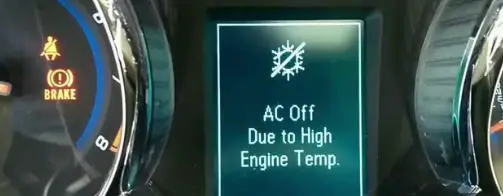When you see the warning message “AC Off Due To High Engine Temp” on your car’s dashboard, it can be alarming. You may wonder what is going on and whether it is safe to continue driving. Do not panic! In this blog post, we will explain what this warning means and what you should do if it comes on. We will also provide information about how to fix the problem if it is caused by something simple.
Let’s take a look!
What Does “AC Off Due To High Engine Temp” Mean?
If you’re driving and you see the warning “AC Off Due To High Engine Temp” on your dashboard, it means that your car’s engine is too hot and the air conditioning system has been turned off.
This is usually nothing to worry about if it happens occasionally, but if it happens frequently or for extended periods of time, it could be a sign of a more serious problem with your engine cooling system.
Why Does The Car Shut Off The AC In This Scenario?
There are two main reasons for this. The first is that the air conditioner puts an extra load on the engine, which can make it overheat more easily. The second reason is that the air conditioner itself could be overheating, and shutting off the AC prevents further damage to the system.
What Are The Possible Reasons For the Engine Temperature To Get To High?
1. A blocked radiator:
The most common cause of an overheating engine is a blocked radiator. The job of the radiator is to keep the engine cool by dissipating heat, so if it becomes blocked, the engine will overheat. There are a few things that can cause a radiator to become blocked, such as leaves or insects getting caught in it, or simply a build-up of grime and dirt. If you think your radiator may be blocked, then it’s important to get it checked out as soon as possible.
2. A faulty thermostat:
Another possible reason for an overheating engine is a faulty thermostat. The thermostat regulates the flow of coolant around the engine, and if it becomes stuck in the “open” position, then coolant will not flow properly and the engine will overheat.
3. A leaking head gasket:
Another potential cause of an overheating engine is a leaking head gasket. The head gasket seals the cylinder head to the engine block and prevents coolant from leaked into the cylinders. If the head gasket fails, then coolant can leak into the cylinders and cause the engine to overheat.
4. A seized water pump:
Another possible cause of an overheating engine is a seized water pump. The water pump circulates coolant around the engine, and if it seizes up, then coolant will not be able to flow properly and the engine will overheat.
5. A damaged radiator hose:
The final possible cause of an overheating engine is a damaged radiator hose. The radiator hose connects the radiator to the engine and allows coolant to flow between them. If the hose is ruptured or leaks, then coolant will not be able to flow properly and the engine will overheat.
Are There Any Other Reasons This Warning Might Appear?
There are a few other reasons that this warning might appear, even if the engine temperature is not actually too high.
One possibility is that the coolant level is low. If the coolant level is low, then there will not be enough fluid to circulate around the engine and it will overheat. Another possibility is that the air conditioning system is not working properly.
If the air conditioning system is not working properly, then it will put an extra load on the engine and cause it to overheat. Finally, this warning might appear if there is a problem with the sensor that measures the engine temperature. If the sensor is faulty, then it may give a false reading and cause this warning to appear even when the engine temperature is normal.
Is It Safe To Drive A Car With This Warning?
Generally speaking, it is safe to drive a car with this warning. However, if the engine temperature gets too high, then there is a risk of damaging the engine.
If you are driving and this warning appears, then it’s important to keep an eye on the engine temperature gauge and make sure that it doesn’t get into the red zone. If it does, then you should pull over and turn off the engine to prevent further damage.
How Do I Cool The Engine Down If It Gets Too Hot?
If you’re driving and your engine temperature warning light comes on, it’s important to take action immediately. The most important thing is to not panic, and to safely pull over as soon as possible. Once you’re off the road, turn off the engine and pop the hood.
Let the car cool down for a few minutes before checking under the hood. If the radiator is still hot, don’t attempt to remove the cap — doing so could result in serious burns.
If it’s safe to do so, open the radiator cap (it will usually have a symbol of a radiator on it) and check the coolant level. If it’s low, then you can add more coolant — just be sure not to add water, as this can damage the engine. Once you’ve topped up the coolant, start the engine and let it idle for a few minutes to see if the temperature gauge goes back down to normal. If it does, then you should be good to go.
What Happens if You Keep Driving an Overheated Car?
If you ignore the warning and keep driving an overheated car, then there’s a risk of damaging the engine. The high temperatures can cause the metal components to warp and break, and it can also damage the gaskets and seals. In extreme cases, an overheated engine can seize up completely, which will render the car undrivable.
In these cases, it is best to get the car towed to a mechanic
How Can This Problem Be Fixed?
If your car is displaying this warning, then the first thing you should do is check the coolant level and make sure that it is topped up. If it is low, then topping it up may solve the problem.
If the coolant level is fine, then the next step is to check the radiator for any blockages. If there are any leaves or insects caught in it, then removing them will usually solve the problem. If there is a build-up of grime and dirt, then cleaning the radiator may be necessary.
If neither of these solutions work, then you should take your car to a mechanic to have it checked out. They will be able to diagnose and fix any other problems that may be causing the engine to overheat.










